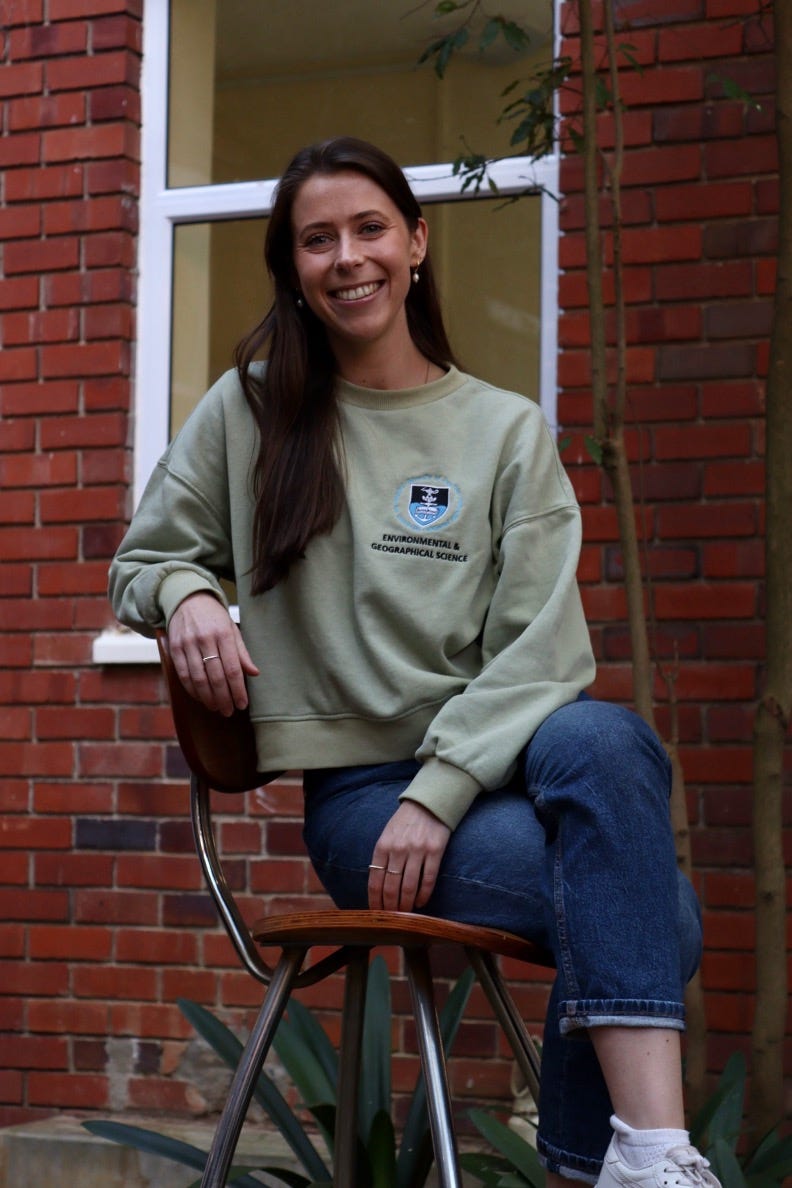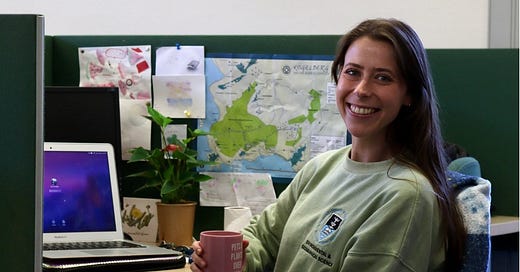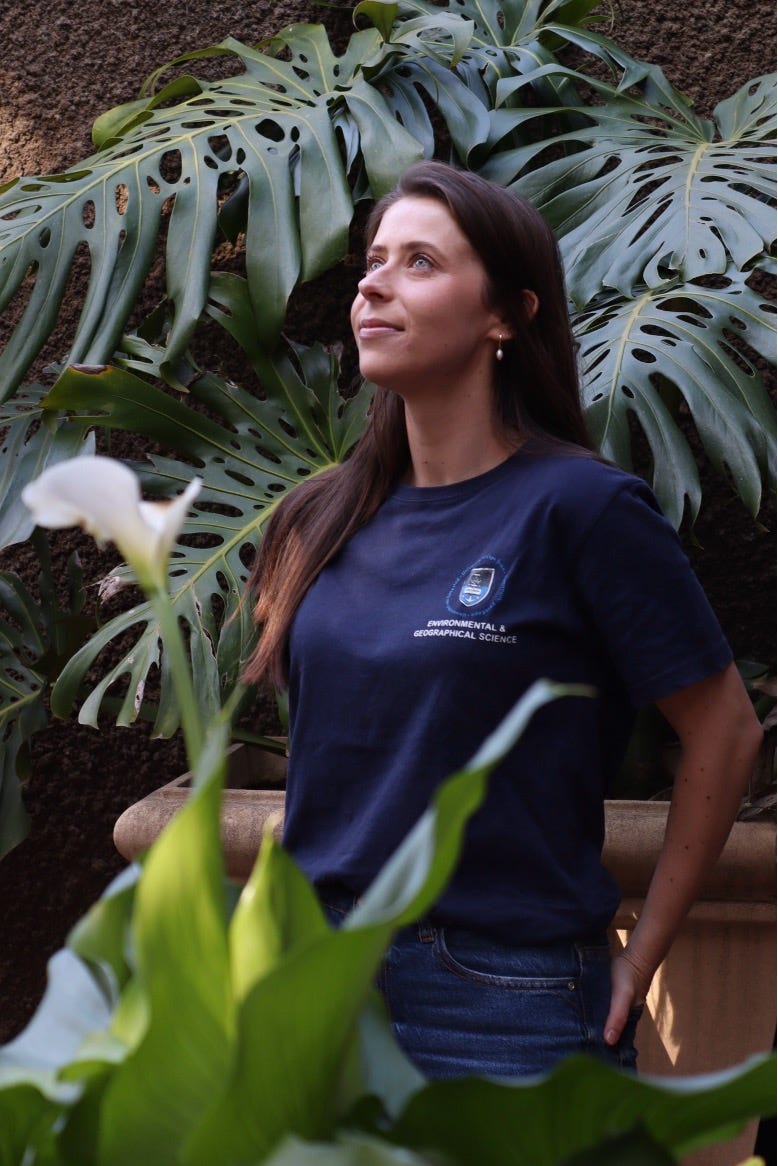Olivia Thompson on Charting New Waters: From Mastering Land Cover Change to an Oceanic Endeavour
Maya Figl
UCT’s Olivia Thompson dives into the world of Southern Ocean research aboard the SA Agulhas II, expanding her set of skills in Environmental and Geographical Sciences.
This year, after three declined applications and the heartbreak that came with them, Olivia Thompson finally boarded the SA Agulhas II, a research vessel that takes its passengers to Antarctica. She was one of 40 postgraduate students, and one of 4 students from the University of Cape Town (UCT), who got to participate in the marine research on the Agulhas System Climate Array (ASCA), a program which afforded her the chance to dip her toes into the world of Southern African marine research.
Currently, Thompson is in her second year as a Master's student in the Environmental and Geographical Sciences (EGS) Department at UCT. In her thesis, she is focusing on using Geographic Information System (GIS) and historical aerial photographs to analyse land cover change through time in the Kogelberg Biosphere Reserve. “I’m looking at multifunctional land use and how that can be used to possibly mediate land use conflict,” she explains. Though her interest now lies primarily in the field of EGS, she majored in Oceanography and Atmospheric Science alongside EGS to obtain her Bachelor of Science (BSc) degree.
“Oceanography I actually signed up for by accident. Whoops! I meant to sign up for Marine Biology and I didn’t know the difference between Oceanography and Marine Biology, so I signed up for the wrong one.”
“You could sit and have breakfast with specialists in their field and ask them questions about the work and research that they do, which I think is a really rare opportunity.”
To her surprise, she thoroughly enjoyed the subject and its focus on Atmospheric Science. This sparked her interest in the SEAmester research expedition. SEAmester, termed “South Africa’s Class Afloat”, was established in 2016 by Professor Isabelle Ansorge from UCT's Oceanography Department, and provides postgraduate students the unique experience of an intense marine-based research trip aboard a state-of-the- art research vessel, the SA Agulhas II. The ten-day-long expedition follows the ASCA Array, a specific set of stations in the South Indian Ocean from which measurements of heat, salt transport, and volume fluctuations are taken annually. These allow researchers to determine patterns in the Agulhas Current and how they vary over time.

Thompson explained that the program was jam-packed, allowing her to fully immerse herself in all the expedition had to offer. Her days consisted of attending Oceanography lectures in the mornings, helping the science team with their water sampling, and performing chemistry practicals, which involved testing oxygen precipitate and doing chlorophyll analyses in the onboard lab. GIS and Marine Spatial Planning practicals were also on the agenda. Beyond that, the students participated in ‘deck work’, where they identified animals such as birds and seals and performed dissections on them, though Thompson admitted she doesn’t like “all the gory stuff.” She also partook in the art stream activities that were offered, which included mosaicking, sketching, and singing, and recalled many funny moments from the trip that she could not disclose as they were “all really naughty stories”. “What happens on the ship stays on the ship!”
Thompson described the experience as extraordinary. “You are just living on this vessel for 10 days with people that you’ve never met before and also lecturers and scientists that you would never normally get the opportunity to interact with and talk to. You could sit and have breakfast with specialists in their field and ask them questions about the work and research that they do, which I think is a really rare opportunity.”
Whilst she did not make it all the way to Antarctica this time, she does consider it a potential future endeavor. The journey is extensive and requires three months to complete, but Thompson mentioned she would definitely go if the opportunity presented itself. The expedition aboard the SA Agulhas II, South Africa’s Icebreaker, offered her valuable insight into what the trip may be like. “I would one hundred percent go to Antarctica and help with the research they do there.”
“Just do something that you are passionate about and that you really enjoy. A huge component is just enjoying what you study.”
Back in rainy Cape Town, Thompson is tackling her Master's work which she says is “going slowly, but it’s going”. Additionally, she is very involved in the EGS Department. Alongside tutoring, she has designed and organised merchandise for the EGS Department and runs the EGS Instagram page (@egs_uct).
“I love the EGS Department, and I love to procrastinate, so it’s a good combo. Instead of doing my actual work I try and organise fun stuff for the department.”
Her love for the Department and the extent to which she is involved has led her to consider pursuing a career as a lecturer in the EGS Department. She began tutoring multiple first and second year EGS courses when she started her Master’s in 2023 and became Head Tutor of both the first- and second-semester second-year courses this year. As much as she is “so sick of reading and writing” for her Master’s, tutoring and forming a vital part of the EGS community has led her to consider applying for her PhD and subsequently becoming a lecturer in the department. “I feel cocky saying that like I’m going to do my PhD and then I’m going to lecture, but I could definitely picture myself being in the EGS department and lecturing. I mean that would maybe be a possible dream job for me.” Thompson did mention she would like some real-world experience—and a break from reading and writing—before she makes her possible return to academia.
Between tutoring and going on once-in-a-lifetime research expeditions, for now, her main focus is on completing her Master's. She manages the heavy workload through her love for the environment and the discipline of Environmental and Geographical Sciences.
“Just do something that you are passionate about and that you really enjoy. A huge component is just enjoying what you study.”





